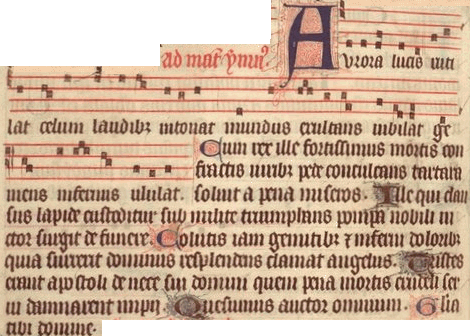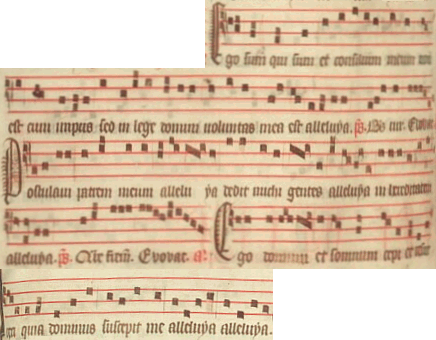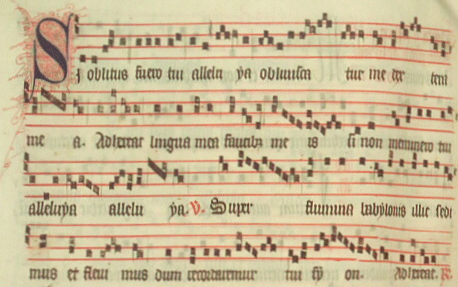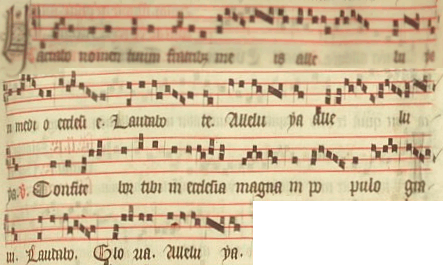READINGS: EASTER SUNDAY V

Invitatory Psalm & BACK


 Psalm 1: Hebrew English Then BACK
Psalm 1: Hebrew English Then BACK
 Psalm 2: Hebrew English Then BACK
Psalm 2: Hebrew English Then BACK
 Psalm 3: Hebrew English Then BACK
Psalm 3: Hebrew English Then BACK
וַיַּעֲלֹז לִבִּי - הַלְלוּ יָהּ — וּמִשִּׁירִי אֲהוֹדֶנּוּ - הַלְלוּ יָהּ
Even Years: Acts 16:16-40 16 ἐγένετο δὲ πορευομένων ἡμῶν εἰς τὴν προσευχὴν παιδίσκην τινὰ ἔχουσαν πνεῦμα πύθωνα ὑπαντῆσαι ἡμῖν, ἥτις ἐργασίαν πολλὴν παρεῖχεν τοῖς κυρίοις αὐτῆς μαντευομένη. 17 αὕτη κατακολουθοῦσα τῷ παύλῳ καὶ ἡμῖν ἔκραζεν λέγουσα, οὗτοι οἱ ἄνθρωποι δοῦλοι τοῦ θεοῦ τοῦ ὑψίστου εἰσίν, οἵτινες καταγγέλλουσιν ὑμῖν ὁδὸν σωτηρίας. 18 τοῦτο δὲ ἐποίει ἐπὶ πολλὰς ἡμέρας. διαπονηθεὶς δὲ παῦλος καὶ ἐπιστρέψας τῷ πνεύματι εἶπεν, παραγγέλλω σοι ἐν ὀνόματι Ἰησοῦ Χριστοῦ ἐξελθεῖν ἀπ' αὐτῆς: καὶ ἐξῆλθεν αὐτῇ τῇ ὥρᾳ. 19 ἰδόντες δὲ οἱ κύριοι αὐτῆς ὅτι ἐξῆλθεν ἡ ἐλπὶς τῆς ἐργασίας αὐτῶν ἐπιλαβόμενοι τὸν παῦλον καὶ τὸν σιλᾶν εἵλκυσαν εἰς τὴν ἀγορὰν ἐπὶ τοὺς ἄρχοντας, 20 καὶ προσαγαγόντες αὐτοὺς τοῖς στρατηγοῖς εἶπαν, οὗτοι οἱ ἄνθρωποι ἐκταράσσουσιν ἡμῶν τὴν πόλιν ἰουδαῖοι ὑπάρχοντες, 21 καὶ καταγγέλλουσιν ἔθη ἃ οὐκ ἔξεστιν ἡμῖν παραδέχεσθαι οὐδὲ ποιεῖν ῥωμαίοις οὖσιν. 22 καὶ συνεπέστη ὁ ὄχλος κατ' αὐτῶν, καὶ οἱ στρατηγοὶ περιρήξαντες αὐτῶν τὰ ἱμάτια ἐκέλευον ῥαβδίζειν, 23 πολλάς τε ἐπιθέντες αὐτοῖς πληγὰς ἔβαλον εἰς φυλακήν, παραγγείλαντες τῷ δεσμοφύλακι ἀσφαλῶς τηρεῖν αὐτούς: 24 ὃς παραγγελίαν τοιαύτην λαβὼν ἔβαλεν αὐτοὺς εἰς τὴν ἐσωτέραν φυλακὴν καὶ τοὺς πόδας ἠσφαλίσατο αὐτῶν εἰς τὸ ξύλον. 25 κατὰ δὲ τὸ μεσονύκτιον παῦλος καὶ σιλᾶς προσευχόμενοι ὕμνουν τὸν θεόν, ἐπηκροῶντο δὲ αὐτῶν οἱ δέσμιοι: 26 ἄφνω δὲ σεισμὸς ἐγένετο μέγας ὥστε σαλευθῆναι τὰ θεμέλια τοῦ δεσμωτηρίου, ἠνεῴχθησαν δὲ παραχρῆμα αἱ θύραι πᾶσαι, καὶ πάντων τὰ δεσμὰ ἀνέθη. 27 ἔξυπνος δὲ γενόμενος ὁ δεσμοφύλαξ καὶ ἰδὼν ἀνεῳγμένας τὰς θύρας τῆς φυλακῆς, σπασάμενος [τὴν] μάχαιραν ἤμελλεν ἑαυτὸν ἀναιρεῖν, νομίζων ἐκπεφευγέναι τοὺς δεσμίους. 28 ἐφώνησεν δὲ μεγάλῃ φωνῇ [ὁ] παῦλος λέγων, μηδὲν πράξῃς σεαυτῷ κακόν, ἅπαντες γάρ ἐσμεν ἐνθάδε. 29 αἰτήσας δὲ φῶτα εἰσεπήδησεν, καὶ ἔντρομος γενόμενος προσέπεσεν τῷ παύλῳ καὶ [τῷ] σιλᾷ, 30 καὶ προαγαγὼν αὐτοὺς ἔξω ἔφη, κύριοι, τί με δεῖ ποιεῖν ἵνα σωθῶ; 31 οἱ δὲ εἶπαν, πίστευσον ἐπὶ τὸν κύριον Ἰησοῦν, καὶ σωθήσῃ σὺ καὶ ὁ οἶκός σου. 32 καὶ ἐλάλησαν αὐτῷ τὸν λόγον τοῦ κυρίου σὺν πᾶσιν τοῖς ἐν τῇ οἰκίᾳ αὐτοῦ. 33 καὶ παραλαβὼν αὐτοὺς ἐν ἐκείνῃ τῇ ὥρᾳ τῆς νυκτὸς ἔλουσεν ἀπὸ τῶν πληγῶν, καὶ ἐβαπτίσθη αὐτὸς καὶ οἱ αὐτοῦ πάντες παραχρῆμα, 34 ἀναγαγών τε αὐτοὺς εἰς τὸν οἶκον παρέθηκεν τράπεζαν, καὶ ἠγαλλιάσατο πανοικεὶ πεπιστευκὼς τῷ θεῷ. 35 ἡμέρας δὲ γενομένης ἀπέστειλαν οἱ στρατηγοὶ τοὺς ῥαβδούχους λέγοντες, ἀπόλυσον τοὺς ἀνθρώπους ἐκείνους. 36 ἀπήγγειλεν δὲ ὁ δεσμοφύλαξ τοὺς λόγους [τούτους] πρὸς τὸν παῦλον, ὅτι ἀπέσταλκαν οἱ στρατηγοὶ ἵνα ἀπολυθῆτε: νῦν οὖν ἐξελθόντες πορεύεσθε ἐν εἰρήνῃ. 37 ὁ δὲ παῦλος ἔφη πρὸς αὐτούς, δείραντες ἡμᾶς δημοσίᾳ ἀκατακρίτους, ἀνθρώπους ῥωμαίους ὑπάρχοντας, ἔβαλαν εἰς φυλακήν: καὶ νῦν λάθρᾳ ἡμᾶς ἐκβάλλουσιν; οὐ γάρ, ἀλλὰ ἐλθόντες αὐτοὶ ἡμᾶς ἐξαγαγέτωσαν. 38 ἀπήγγειλαν δὲ τοῖς στρατηγοῖς οἱ ῥαβδοῦχοι τὰ ῥήματα ταῦτα. ἐφοβήθησαν δὲ ἀκούσαντες ὅτι ῥωμαῖοί εἰσιν, 39 καὶ ἐλθόντες παρεκάλεσαν αὐτούς, καὶ ἐξαγαγόντες ἠρώτων ἀπελθεῖν ἀπὸ τῆς πόλεως. 40 ἐξελθόντες δὲ ἀπὸ τῆς φυλακῆς εἰσῆλθον πρὸς τὴν λυδίαν, καὶ ἰδόντες παρεκάλεσαν τοὺς ἀδελφοὺς καὶ ἐξῆλθαν. Odd Years: Revelation 18:21—19:10 καὶ
ἦρεν εἷς
ἄγγελος
ἰσχυρὸς λίθον
ὡς μύλινον
μέγαν
|
Even Years: Origen, Commentary on Romans, Book 5:9 (PG 14,1043-1044) Si enim complantati facti sumus similitudini mortis eius, etiam resurrectionis erimus, hoc scientes, quia vetus homo noster simul crucifixus est ei, ut destruatur corpus peccati, ut ultra non serviamus peccato Idcirco namque et mortuos nos dicit esse peccato, et quicunque baptizati sumus in Christo, in morte ipsius baptizatos nos dicit: et nunc complantatos nos ad mortis eius similitudinem scribit, addens quod si similitudinem mortis eius, qua peccato mortuus est, geramus, etiam resurrectionis similitudinem sperare debeamus. Sed hoc quatenus possit fieri ostendit dicens, quia vetus homo noster concrucifigi debeat Christo. Vetus autem homo noster intelligendus est vita prior quam duximus in peccatis, cuius finem et interitum quemdam facimus ubi recipimus in nobis fidem crucis Chrsti, per quam ita destruitur corpus peccati, ut membra nostra, quae serviebant peccato, ultra ei non serviant, sed Deo. Sed nunc repetentes sermonem, videamus quid est complantari similitudini mortis Christi, in quo velut plantam alicuius arboris ostendit mortem Christi, cui nos complantatos vult esse, ut ex succo radicis eius radix quoque nostra suscipiens producat ramos iustitiae, et fructus afferat vitae. Quid si vis de Scripturis agnoscere quae ista sit planta cui complantati esse debeamus, et cuius generis arbor, audi quid de Sapientia scribitur: Arbor, inquit, vitae est omnibus sperantibus in se; et qui confidunt in ea tanquam in Domino. Christus ergo Dei virtus, et Dei sapientia, ipse est arbor vitae, cui complantari debemus, et novo quodam atque amabili Dei dono mors illius nobis arbor vitae efficitur. Bene autem Apostulus, sciens se in praesenti loco non de communi hac, sed de peccati morte tractare, non dixit: Si enim complantati sumus morti eius, sed, similitudini mortis eius. Christus enim ita semel mortuus est peccato, ut peccatum omnino non fecerit, nec dolus inventus sit in ore eius. Quod in alio homine ex integro inveniri omnino non poterit. Nemo enim mundus a peccato, nec si unius diei fuerit vita eius. Idcirco ergo ipsa quidem morte qua Iesus mortuus est peccato, ut peccatum omnino non fecerit, nos non possumus mori ut omnino nesciamus peccatum: similitudinem tamen habere possumus, ut imitantes eium, et vestigia eius sequentes abstineamus nos a peccato. Hoc est ergo quod recipere potest humana natura, ut in similitudinem mortis eius fiat, dum ipsum imitando non peccat Et vide quam necessario formam plantationis assumpserit. Omnis etenim planta post hiemis mortem resurrectione veris expectat. Si ergo et nos in Christi morte complantati sumus in hieme saeculi huius et praesentis vitae, etiam ad futurum ver inveniemur fructus iustitiae ex ipsius radice proferentes; et si complantati sumus ei, necesse est ut Pater agricola purget nos tanquam palmites vitis verae, ut fructum plurimum afferamus. Odd Years: Augustine, Commentary on Psalm 148, 1-2 (CCL 40, 2165-2166)
|
GOSPELS FOR THE THREE CYCLES
*A* , *B* , *C*
| Prayer |

